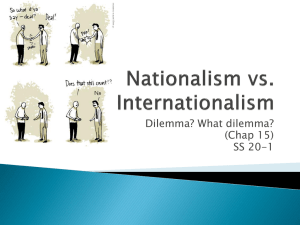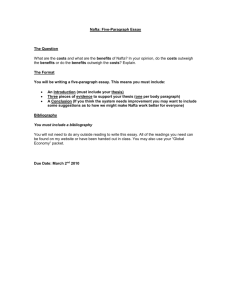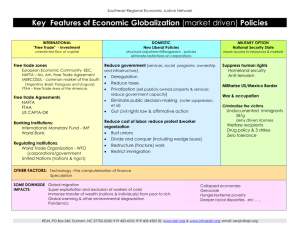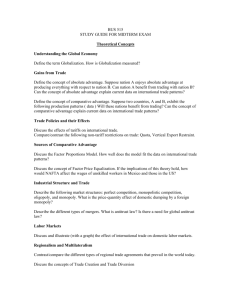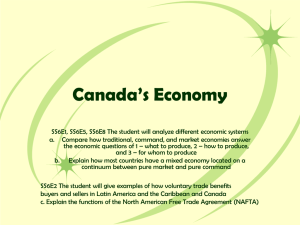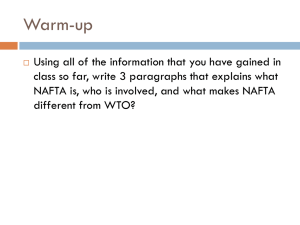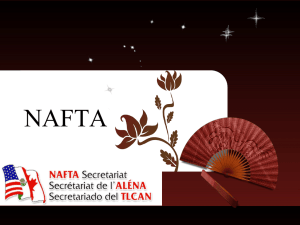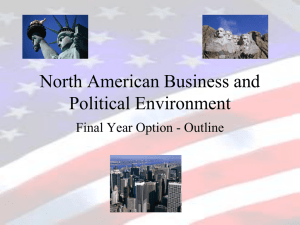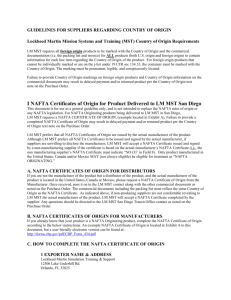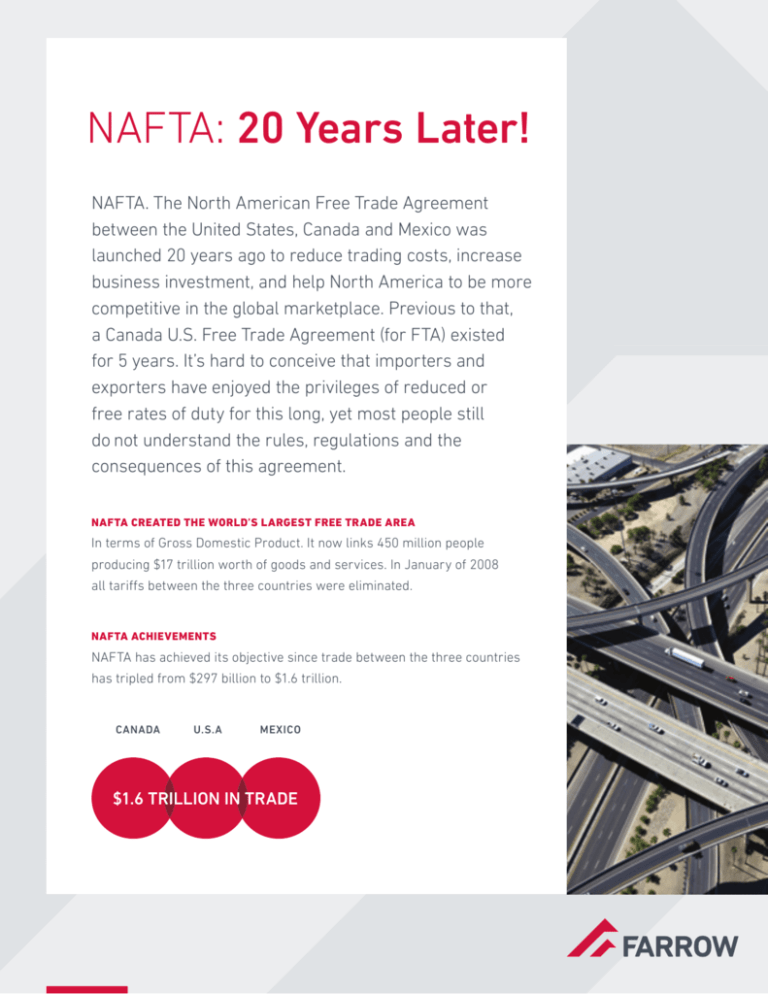
NAFTA: 20 Years Later!
NAFTA. The North American Free Trade Agreement
between the United States, Canada and Mexico was
launched 20 years ago to reduce trading costs, increase
business investment, and help North America to be more
competitive in the global marketplace. Previous to that,
a Canada U.S. Free Trade Agreement (for FTA) existed
for 5 years. It’s hard to conceive that importers and
exporters have enjoyed the privileges of reduced or
free rates of duty for this long, yet most people still
do not understand the rules, regulations and the
consequences of this agreement.
NAFTA CREATED THE WORLD’S LARGEST FREE TRADE AREA
In terms of Gross Domestic Product. It now links 450 million people
producing $17 trillion worth of goods and services. In January of 2008
all tariffs between the three countries were eliminated.
NAFTA ACHIEVEMENTS
NAFTA has achieved its objective since trade between the three countries
has tripled from $297 billion to $1.6 trillion.
CANADA
U.S.A
MEXICO
$1.6 TRILLION IN TRADE
ARTICLE 102 OF THE NAFTA AGREEMENT OUTLINES ITS PURPOSE:
• Grant the signatories national treatment,
most-favored-nation treatment and transparency.
• Eliminate barriers to trade and facilitate the cross-border
movement of good and services.
• Promote conditions of fair competition.
• Increase investment opportunities.
• Provide protection and enforcement of
intellectual property rights.
• Create procedures for the resolution of trade disputes.
NAFTA IS A PRIVILEGE NOT A RIGHT
To participate in NAFTA, importers and exporters must abide by the
rules and ensure that the goods covered by the Certificate of Origin
actually qualify under the NAFTA rules of origin. Should they not,
importers may be required to pay back the duty, which can have a
substantial impact to the bottom line.
In order to receive the benefits of NAFTA all goods must be certified
and declared on a NAFTA Certificate of Origin that must be completed
and signed by the exporter. The certificate is a legal document with legal
consequences. Prior to completing a certificate, an understanding of the
rules and regulations is required. Unfortunately, a Certificate of Origin
has devolved into a shipping document, with little or no credibility that
the goods included actually qualify for preferential status.
The NAFTA rules of origin are lengthy and complex – they are difficult
to interpret without extensive knowledge of the agreement.
There are many goods that are manufactured
Reviewing your bills of material, examining the
in the United States, Canada or Mexico which
rules of origin and making a proper determination
do not meet the rules and therefore do not
prior to exporting your goods is critical.
qualify. A misconception persists that as long
as a manufacturer has over 50% regional value
If this process is not followed correctly, in the
content (RVC) then a good will qualify. This is
event of a NAFTA Audit by any of the three
not correct – in fact, there are many products
customs services, an importer could be facing
with over 50% RVC which do not qualify. Most
a substantial retroactive payment of duty, plus
of the rules of origin within the agreement
penalties and interest.
require a tariff shift. A tariff shift is a change
in tariff classification as a result of substantial
By using the “privilege” of NAFTA over the past 20
transformation within a NAFTA territory. As
years importers have saved an enormous amount
example – flour into a cake, bearings into
of duty, but could incur unexpected penalties if
a machine or paper into a book.
preferential status is claimed incorrectly.
The interpretation is not always that simple.
There is a cost to NAFTA, whether it be internal
An example would be oranges grown in Brazil,
or external, to properly certify goods. It is a
shipped into the United States where they are
continous process that must be completed each
squeezed into orange juice, then shipped to
and every year.
Canada. This is an example of a product that
will not qualify as an originating good, as it
WOULD YOU LIKE MORE INFORMATION ABOUT
has not undergone a substantial change based
NAFTA REGULATIONS AND BENEFITS?
on the rule of origin.
EMAIL
peaceofmind@farrow.com
Importers are encouraged
to get qualified help!
This publication is not intended to provide legal or other professional advice. Readers are asked to contact
their local Farrow representative for advice specific to their needs. Information provided is believed to be
accurate at time of publication. Copyright © 2014 by Russell A. Farrow Limited. All rights reserved.

